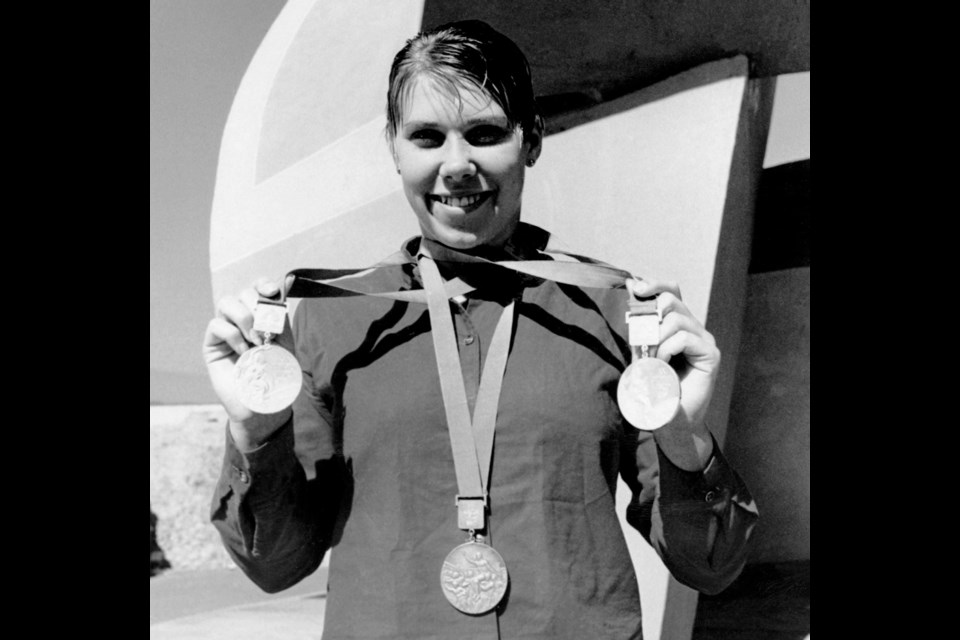Qualicum Beach resident Elaine Tanner has come to accept her achievement of 50 years ago for what it is — a landmark moment in Canadian sports history.
It wasn’t viewed that way at the time, however.
Tanner not only became the first Canadian female swimmer to medal in the Olympics, and the first Canadian to win a swimming medal since 1928, but her three medals at Mexico City in 1968 almost single-handedly matched Canada’s all-time previous Olympic pool output of five.
But among her two individual silver medals and relay bronze wasn’t the expected gold. Tanner became the victim of overwhelming expectations that were not of her making and returned to Canada labelled an underachiever. She was just 17.
Only later has the Canadian sporting public, and Tanner herself, come to view her breakthrough in Mexico City as the epoch-defining feat that it was.
So much so that the Vancouver Canucks celebrated the 50th anniversary with a tribute mention of Tanner and invited her as a special guest to Saturday night’s game against the Boston Bruins at Rogers Arena. It has been a long journey to get there.
“I had to come back to Canada as a gold medallist and began to think of it as a negative thing that I didn’t,” said five-foot-three Tanner, nicknamed Mighty Mouse.
“I was just a kid who loved to swim. I was as shocked as anybody else by my success in the 1966 Commonwealth Games [seven medals, four of them gold] and 1967 Pan Am Games [five medals and two golds in world-record times]. But I received so much press. I didn’t like it and was never comfortable with it.
“Because of it, my private dream of an Olympic gold medal suddenly became a national dream and I had to share it with 26 million people. Then I thought, what if I lose and let them down?
“The seed of doubt creeps in and that seed becomes an oak tree. In many ways, it was pre-destined. National team athletes today have a safety net. We had no support system. Not even a massage therapist, never mind a team psychologist.”
Tanner said her post-Olympic experience mirrored what today is referred to as post-traumatic stress disorder, as she spiralled into severe emotional and career decline. Time, and perspective, are the great salves.
“I’m proud of what I did, but prouder of the person I’ve become,” said Tanner, a 67-year-old grandmother of three, who does a lot of charity work with children. “You learn wisdom through life and share it with others. Something you think is the ultimate goal, often is not. It takes a long time to figure that out.”
Tanner has done just that.
“Validation does not come from the outside. It comes from the inside,” Tanner said.
The 1968 Summer Olympics happened amid the turbulent political cauldron of a watershed year, with the Vietnam War raging, and after the assassinations of Martin Luther King and Robert Kennedy. The Mexico City Olympics became a part of it, with hundreds of student protesters killed as the Mexican government clamped down just before the opening ceremony. In a sign of the rage of the age, the 1968 Olympics are indelibly marked by the black power salute delivered on the podium by U.S. sprinters John Carlos and Tommie Smith.
“You look back on it now as such an historic time with so much going on,” Tanner said.
“I can’t believe it’s been 50 years.”
Tanner, an officer of the Order of Canada, grew up in West Vancouver but has spent large parts of her life on the Island. Her late parents lived in Sidney and her daughter, Shannon, is a school counsellor in Greater Victoria. Sister Glennis also lives in Victoria and son Scott is in Prince George.
Tanner wrote a manuscript for her three grandchildren, Grayson, Alex and Nathan. It evolved into a self-published children’s book, Monkey Guy and Cosmic Fairy, which she takes to school visits and such around the Island.
“Interacting with children keeps you youthful and curious. The story is about unconditional love and to be kind in the journey of life,” Tanner said.
And quite a life’s journey it has been, leading up to, and the five decades since that week in the pool in Mexico City.
cdheensaw@timescolonist



